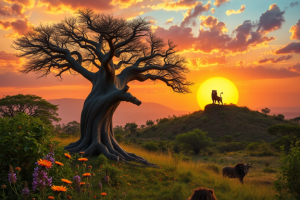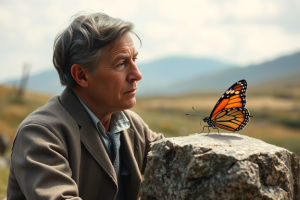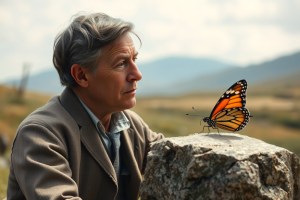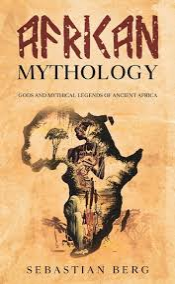
African mythology and culture are rich tapestries woven from diverse traditions, languages, and histories, offering profound insights into human existence, community values, and the natural world. This article explores the significant contributions of African mythology and culture to global well-being, emphasizing their influence on philosophy, art, spirituality, and social structures.
African mythology is not merely a collection of stories; it embodies deep philosophical principles that address the human condition. Concepts such as Ubuntu, which highlights interconnectedness and community, promote mutual respect and cooperation. This philosophy has gained global recognition, encouraging societies to foster compassion and solidarity, which are crucial for addressing contemporary issues like inequality and social injustice. Ubuntu teaches that one’s humanity is tied to the well-being of others, inspiring movements advocating for human rights and social justice worldwide and underscoring the importance of community in fostering individual growth and societal progress.
Spiritual practices within many African cultures emphasize a holistic view of existence, where the spiritual, physical, and social realms are interconnected. Myths and rituals celebrate the cycles of life, death, and rebirth, fostering resilience and hope. These beliefs encourage sustainable living, respect for nature, and a sense of responsibility toward future generations. Many African cultures view nature as sacred, promoting conservation and sustainable practices. This perspective is increasingly relevant in today’s context of climate change, offering lessons on living harmoniously with the environment. Traditional ecological knowledge, rooted in these mythologies, can inform modern environmental practices and policies.
Art in Africa, deeply intertwined with mythology, serves as a powerful medium for storytelling and cultural expression. From sculptures and masks to music and dance, these art forms convey moral lessons, historical narratives, and communal values. Artistic expressions rooted in African mythology contribute to cultural resilience, allowing communities to preserve their heritage while adapting to modern influences. This cultural continuity fosters a sense of identity and belonging, which is vital for psychological well-being. The global appreciation of African art has also enriched international artistic landscapes, promoting cross-cultural dialogue.
Communal living is a hallmark of many African cultures, where collective well-being often overrides individual desires. Traditional practices such as communal farming, shared child-rearing, and collective decision-making reflect this ethos. Furthermore, African methods of conflict resolution, such as those found in the Gacaca courts of Rwanda or the use of elders as mediators, emphasize dialogue and reconciliation over punishment. These practices offer valuable frameworks for resolving conflicts in diverse societies, promoting peace and unity.
African mythology is also rich with healing traditions that encompass physical, emotional, and spiritual health. Healers often draw on ancestral knowledge and rituals to treat ailments, providing holistic care that resonates with many contemporary approaches to health. The integration of traditional healing practices with modern medicine can enhance healthcare outcomes, especially in underserved communities. This hybrid approach respects cultural beliefs while improving access to medical care, contributing to overall societal well-being.
Emphasizingm oral traditions, storytelling, and experiential learning, African cultures promote critical thinking and creativity, fostering an environment where knowledge is shared and preserved. Incorporating African perspectives into global education systems enriches curricula and promotes diversity. Understanding different worldviews enhances empathy and global citizenship, essential in today’s interconnected world.
The contributions of African mythology and culture to global well-being are profound and multifaceted. From philosophical insights that promote community and cooperation to artistic expressions that celebrate identity, these traditions offer valuable lessons for addressing contemporary challenges. Embracing and integrating these rich narratives into global discourse can foster a more inclusive, compassionate, and sustainable world. As we navigate the complexities of modern life, the wisdom embedded in African cultures serves as a guiding light, reminding us of our shared humanity.
To advance the contributions of African mythology and culture, several strategic actions can be implemented. Investing in initiatives that document and preserve indigenous languages, traditions, and art forms will ensure that cultural heritage is maintained for future generations. Reforming education systems to integrate African history and mythology into curricula worldwide fosters greater understanding and appreciation of diverse cultures among students.
Promoting traditional ecological knowledge in modern environmental policies provides valuable insights into sustainable living and conservation efforts. Supporting African artists and cultural practitioners by providing platforms for their work enriches global art scenes while highlighting African narratives. Encouraging local entrepreneurship and cooperative initiatives enhances economic resilience and community well-being.
Implementing traditional conflict resolution methods in contemporary settings can promote dialogue and reconciliation within communities. Additionally, fostering collaborations between African nations and international organizations to share knowledge and resources will focus on mutual development goals. Ensuring that African voices are represented in global discussions on issues like climate change and cultural preservation amplifies their perspectives.
Regaining the ancient civilization and mightiness of Africa requires a holistic approach that emphasizes cultural pride, economic empowerment, political stability, and educational advancement. By fostering a deep connection to their heritage and embracing modern advancements, Africans can work towards a future that honors their rich history while addressing contemporary challenges. Collaboration within the continent and with the global community will be essential in this journey toward rejuvenation and strength.
Background on Mythology and African Mythology
Mythology is a collection of stories and beliefs that explain the origins, customs, and values of a culture. These narratives often involve gods, supernatural beings, and heroic figures, serving to provide a framework for understanding the world and humanity’s place within it. Myths are universal, appearing in various forms across cultures, and they play a crucial role in shaping societal norms, morals, and identities. They offer insights into the human experience, addressing fundamental questions about existence, creation, morality, and the afterlife.
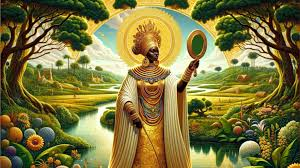
African mythology, in particular, is rich and diverse, reflecting the continent’s vast array of cultures, languages, and histories. It encompasses a multitude of belief systems, each with its own unique stories and deities. Unlike many Western mythologies that often focus on a singular creation story, African mythology features a plethora of narratives that vary significantly from one region to another, influenced by local customs and environments.
Central to African mythology is the concept of a supreme being or creator, often accompanied by a pantheon of lesser gods and spirits. These deities are frequently associated with natural elements, such as rivers, mountains, and animals, highlighting the deep connection between African cultures and the natural world. Myths often explain natural phenomena, such as the changing seasons or the cycle of life and death, through the actions and interactions of these divine figures.
One notable aspect of African mythology is its emphasis on community and interconnectedness. Concepts such as Ubuntu, which means “I am because we are,” underscore the importance of relationships and communal well-being. Myths often serve to reinforce social norms, ethics, and the responsibilities individuals have towards one another and their environment.
Moreover, oral tradition plays a vital role in the transmission of African myths. Stories are passed down through generations by griots or storytellers, ensuring that cultural knowledge and history remain alive. This oral storytelling tradition not only preserves myths but also fosters a sense of identity and belonging within communities.
In contemporary society, African mythology continues to influence art, literature, and spirituality, offering profound insights and lessons applicable to modern challenges. As the world increasingly recognizes the value of diverse cultural perspectives, African mythology stands as a testament to the richness and complexity of human thought and experience. Through its narratives, it invites us to reflect on our own lives and the interconnectedness of all beings.
BY LAKACHEW ATINAFU
THE ETHIOPIAN HERALD THURSDAY 15 MAY 2025


